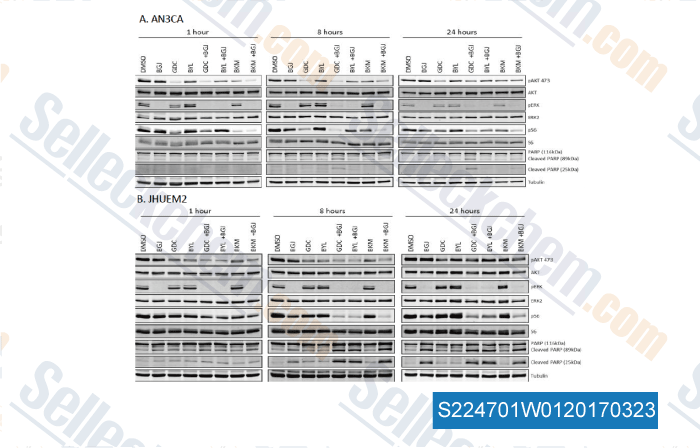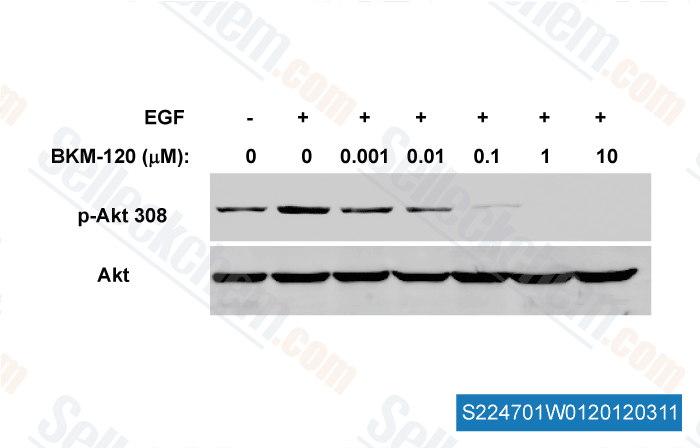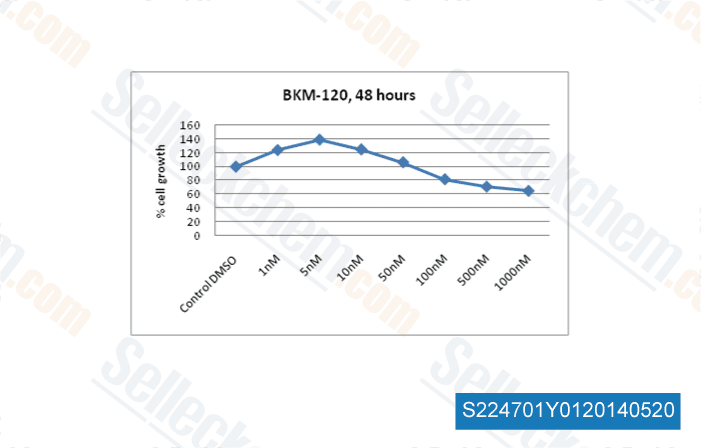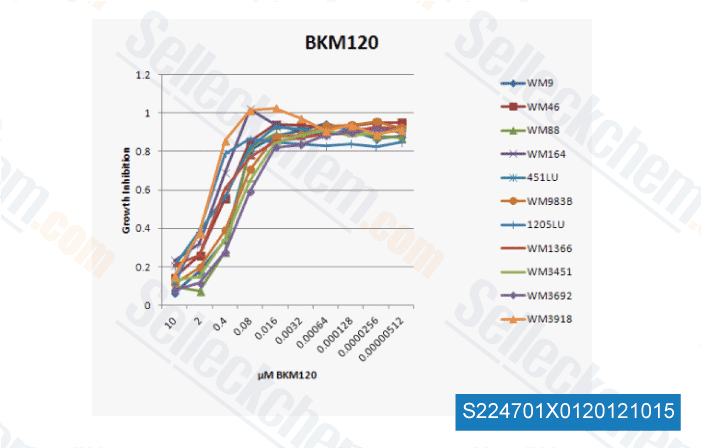|
Toll Free: (877) 796-6397 -- USA and Canada only -- |
Fax: +1-832-582-8590 Orders: +1-832-582-8158 |
Tech Support: +1-832-582-8158 Ext:3 Please provide your Order Number in the email. |
Technical Data
| Formula | C18H21F3N6O2 |
|||
| Molecular Weight | 410.39 | CAS No. | 944396-07-0 | |
| Solubility (25°C)* | In vitro | DMSO | 82 mg/mL (199.8 mM) | |
| Ethanol | 82 mg/mL (199.8 mM) | |||
| Water | Insoluble | |||
|
* <1 mg/ml means slightly soluble or insoluble. * Please note that Selleck tests the solubility of all compounds in-house, and the actual solubility may differ slightly from published values. This is normal and is due to slight batch-to-batch variations. * Room temperature shipping (Stability testing shows this product can be shipped without any cooling measures.) |
||||
Preparing Stock Solutions
Biological Activity
| Description | Buparlisib (BKM120, NVP-BKM120) is a selective PI3K inhibitor of p110α/β/δ/γ with IC50 of 52 nM/166 nM/116 nM/262 nM in cell-free assays, respectively. Reduced potency against VPS34, mTOR, DNAPK, with little activity to PI4Kβ. Buparlisib induces apoptosis. Phase 2. | |||||||||||
|---|---|---|---|---|---|---|---|---|---|---|---|---|
| Targets |
|
|||||||||||
| In vitro | BKM120 is not sensitive to Class III and Class IV PI3K's or PI4K. NVP-BKM120 shows great antiproliferation activity to PI3K deregulated cell lines including A2780, U87MG, MCF7 and DU145 with GI50 of 0.1-0.7 nM. [1] BKM120 induces multiple myeloma cells (ARP1, ARK, MM.1S, MM1.R and U266) apoptosis, which results in increased G1-phase cells and decreased S-phase cells. BKM120 induced CD138+ primary MM cell apoptosis and has significant lower cytotoxicity toward CD138− stromal cells. BKM120 exposure could cause upregulation of BimS and downregulation of XIAP. [2] BKM120 demonstrates antiproliferative activity in human gastric cancer cell lines by decreasing mTOR downstream signaling. BKM120 could increase either p-ERK or p-STAT3 in KRAS mutant gastric cancer cells. Combination with STAT3 blockade, BKM120 shows a synergism in cells harboring mutated KRAS by inducing apoptosis, but not in KRAS wild-type cells. [3] A recent study shows that BKM120 shows differential forms of cell death on the basis of p53 status of the cells with p53 wild-type cells undergoing apoptotic cell death and p53 mutant/deleted cells having a mitotic catastrophe cell death. BKM120 mediates mitotic catastrophe mainly through Aurora B kinase. [4] | |||||||||||
| In vivo | BKM120 completely inhibits pAktser473 in A2780 xenograft tumors at doses of 30, 60, or 100 mg/kg, respectively. BKM120 also shows antitumor activity against U87MG glioma model at doses of 30 and 60 mg/kg. [1] BKM120 treatment results in significantly reduced tumor volume and level of circulating human kappa chain at 5 μM/kg/day−1in ARP1 SCID mouse model, with prolonged survival. [2] |
Protocol (from reference)
| Kinase Assay:[1] |
|
|---|---|
| Cell Assay:[1] |
|
| Animal Study:[1] |
|
References
Customer Product Validation

-
, , Mol Cancer Ther, 2017, 16(4):637-648

-
, , Dr. Zhang of Tianjin Medical University

-
Data independently produced by , , Dr. Pilar Eroles of INCLIVA Biomedical Research Institute.

-
, , One customer
Selleck's Buparlisib (BKM120) has been cited by 297 publications
| PPARα-mediated lipid metabolism reprogramming supports anti-EGFR therapy resistance in head and neck squamous cell carcinoma [ Nat Commun, 2025, 16(1):1237] | PubMed: 39890801 |
| Low-Dose Perifosine, a Phase II Phospholipid Akt Inhibitor, Selectively Sensitizes Drug-Resistant ABCB1-Overexpressing Cancer Cells [ Biomol Ther (Seoul), 2025, 33(1):170-181] | PubMed: 39632683 |
| Nf1 mutation disrupts activity-dependent oligodendroglial plasticity and motor learning in mice [ Nat Neurosci, 2024, 27(8):1555-1564.] | PubMed: 38816530 |
| Immune escape of multiple myeloma cells results from low miR29b and the ensuing epigenetic silencing of proteasome genes [ Biomark Res, 2024, 12(1):43] | PubMed: 38654298 |
| Functional activation of the AKT-mTOR signalling axis in a real-world metastatic breast cancer cohort [ Br J Cancer, 2024, 131(9):1543-1554] | PubMed: 39322687 |
| Proteome-wide CETSA reveals diverse apoptosis-inducing mechanisms converging on an initial apoptosis effector stage at the nuclear periphery [ Cell Rep, 2024, 43(10):114784] | PubMed: 39365699 |
| Buparlisib and ponatinib inhibit aggressiveness of cholangiocarcinoma cells via suppression of IRS1-related pathway by targeting oxidative stress resistance [ Biomed Pharmacother, 2024, 180:117569] | PubMed: 39418964 |
| Mcl-1 mediates intrinsic resistance to RAF inhibitors in mutant BRAF papillary thyroid carcinoma [ Cell Death Discov, 2024, 10(1):175] | PubMed: 38622136 |
| Establishment, characterization, and biobanking of 36 pancreatic cancer organoids: prediction of metastasis in resectable pancreatic cancer [ Cell Oncol (Dordr), 2024, 10.1007/s13402-024-00939-5] | PubMed: 38619751 |
| WWP1 inhibition suppresses the proliferation of pancreatic cancer cells by regulating the PI3K-AKT pathway [ J Gastroenterol, 2024, 10.1007/s00535-024-02192-x] | PubMed: 39656237 |
RETURN POLICY
Selleck Chemical’s Unconditional Return Policy ensures a smooth online shopping experience for our customers. If you are in any way unsatisfied with your purchase, you may return any item(s) within 7 days of receiving it. In the event of product quality issues, either protocol related or product related problems, you may return any item(s) within 365 days from the original purchase date. Please follow the instructions below when returning products.
SHIPPING AND STORAGE
Selleck products are transported at room temperature. If you receive the product at room temperature, please rest assured, the Selleck Quality Inspection Department has conducted experiments to verify that the normal temperature placement of one month will not affect the biological activity of powder products. After collecting, please store the product according to the requirements described in the datasheet. Most Selleck products are stable under the recommended conditions.
NOT FOR HUMAN, VETERINARY DIAGNOSTIC OR THERAPEUTIC USE.
